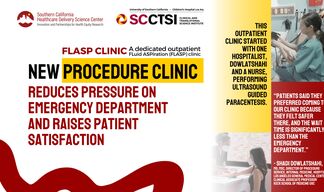What is Translational Medicine?
Medical advancement requires teams of bench scientists, clinical researchers, clinicians and other health.
Translational medicine is based on the philosophy that scientific discoveries must be translated to applications in human health if they are to have an important societal impact. According to the Keck School of Medicine’s strategic plan, the importance of a translational approach to medicine is critical.
“Medical advancement requires teams of bench scientists, clinical researchers, clinicians and other health providers to set research priorities that are most relevant to health needs and to assure that discoveries fulfill their potential to improve health and health care,” according to the plan.

Keck School of Medicine diabetes researcher Enrique Trigo interviews patient Susana Rodriguez as part of a study on the genetics of beta cell failure in Mexican-Americans.
The plan identifies six key areas for translational development that link researchers with clinicians. Those six areas of focus include cancer, neurosciences, cardiovascular disease, obesity, diabetes and metabolic disease.
“It’s not just about studying molecules at the bench. It’s understanding how a molecule can translate into a therapeutic that can be commercialized for public use,” says Thomas A. Buchanan, M.D., associate dean for clinical research at the Keck School of Medicine of USC. He is also principal investigator and director of the Clinical and Translational Science Institute.



